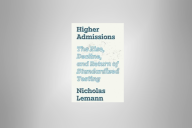You have /5 articles left.
Sign up for a free account or log in.
(This piece is speculative; I’m thinking out loud.)
I’ve had some variation on this conversation countless times in my career.
Prof: Plagiarism is out of control.
Me: What do you think the penalty for plagiarizing a paper should be?
Prof: Kick 'em out of class! Better yet, kick 'em out of college! Integrity matters.
Me: Have you had students plagiarize in your classes?
Prof: Of course! They do it all the time. It’s really frustrating.
Me: So how come you’ve never reported one?
Prof: I don’t want to get them all caught up in a system …
Me: (sigh)
--
Since going remote, I’ve had more of those conversations than usual.
Obviously, enforcement is a sign that something has already gone wrong. I’d much rather talk about innovative assignments that both engage students’ interest and make cheating difficult. And some cases of plagiarism are really just sloppy footnoting; in those cases, I agree that the right approach is for the instructor to speak to the student directly. Knock off some points, maybe, but treat it as a disappointing performance rather than an offense.
But I don’t believe that if every assignment were engaging, nobody would ever cheat. Anyone with a sense of history knows that systems based on human perfection are bound to fail. Some students will take shortcuts because they’re overwhelmed; others will take shortcuts because that’s what they do. That’s why we have laws, policies and processes. Even though it’s unpleasant, some kind of enforcement is necessary.
But there’s a countervailing force that often gets ignored. The best academic dishonesty policy in the world won’t work if faculty don’t use it. I’ve seen the exact same people who call for the harshest penalties in the abstract back away from reporting anyone, for fear of some version of the penalties actually happening.
That’s why I’d like to see a schedule of relatively light penalties for typical first offenses, along the lines of a zero on the assignment. (That often, though not always, leads to failure of the course.) The goal of doing that is to encourage reporting; the goal of encouraging reporting is to be able to identify the few students who cheat over and over again. When it comes to repeat offenders, I’m much more willing to endorse severe penalties. But we can only identify repeat offenses if we know who already committed first ones.
Relatively consistent penalties can also help prevent inadvertent discrimination. When people don’t report plagiarism, insisting instead that they can handle it themselves, we’re essentially gambling that they have their unconscious biases under control. That’s … optimistic. I’d much rather have some sort of consistent rules that we could apply evenly. If it turns out that there really isn’t any bias, then no harm done; if there is, then fairness would be an improvement.
If the penalties the first time around are fairly mild, I would hope we could get reasonably consistent reporting. As a professor, I can give a zero grade anyway; if it’s truly the student’s first offense, and the student never pulls that again, then there’s no additional harm to the student. But the next time around, the student can’t claim to have had no idea.
The paradox is that lesser penalties up front could actually result in better enforcement. We’d be likelier to catch the really brazen serial offenders, while being more consistent and fair with everyone else.
Someday …







